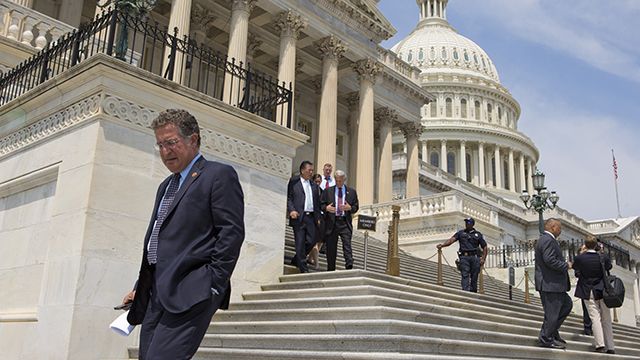
In April, Doug Rice, senior policy analyst at the Center on Budget and Policy Priorities, warned that sequestration would lead to the loss of rental assistance for up to 140,000 low-income families.
Last week, he held out a glimmer of hope that a bipartisan Senate appropriations bill would reverse those cuts.
According to Rice, the Senate transportation, housing and urban development (THUD) bill would restore funding for 99 percent of the Section 8 rental assistance vouchers in use prior to sequestration. Such legislation would be significant to say the least considering the state of affordable housing in America even prior to sequestration.
“Before sequestration, the number of families that were paying unaffordable housing costs had been rising dramatically,” said Rice. “And we’ve seen an uptick in families with kids who are experiencing homelessness since the recession.”
Only 1 in 4 eligible households receives a voucher or some other form of federal rental assistance. The average household income is just $12,500 — well below the poverty line of about $18,000 for a family of three.
Rice said that sequestration is especially hitting families “who are paying 60, 70, 80 percent of their income on housing costs.”
“These are typically families that have incomes below the poverty line — they tend to be seniors, people with disabilities and working families with kids,” said Rice. “It makes it very difficult for them to buy other things they need like food and transportation to get to work, and prescription drugs. And they are at greater risk of falling behind on their rent, getting evicted and becoming homeless.”
The House THUD bill would increase voucher funding compared to 2013, but it still would lock in voucher eliminations for 100,000 low-income families rather than restoring that funding as proposed in the Senate bill. Further, it would make deep cuts to the capital repairs program for public housing, funding it at $1.5 billion — several hundred million dollars less than the post-sequestration level. While Section 8 vouchers represent the nation’s largest rental assistance program, public housing still helps more than 1 million low-income families.
A Department of Housing and Urban Development (HUD) concluded that there are approximately $26 billion in existing public housing repair needs — heating and cooling systems that need to be replaced, leaking roofs that need to be fixed, security systems that need repair, for example. The House proposal of $1.5 billion is less than half the amount local housing agencies need simply to address new capital repairs that accrue every year. The result would be an increase in the backlog of needed work. (The Senate would fund capital repairs at $2 billion, also inadequate, but according to Rice comparable to funding levels in recent years.)
“For low-income families, this means the quality of the housing that they live in will continue to deteriorate over time, and it can also lead to more costly repairs down the road so it’s not cost-effective,” said Rice. “Over the longer term, as buildings continue to deteriorate, it becomes prohibitive to even preserve them, so we’ll see the loss of more units.”
Over the past 15 to 20 years the U.S. has lost roughly 250,000 units of public housing.
“That would continue and accelerate under the House proposed bill,” said Rice.
So that’s what the bills would have done, and here is what happened: nothing. The Senate had a strong bipartisan bill when Senator Mitch McConnell suddenly torpedoed it in the eleventh hour, possibly due to his tough primary fight, according to New York Times columnist Gail Collins. It failed to receive the necessary 60 votes for cloture and so it didn’t even get a vote.
And the House did what the House is doing a lot of these days — devolved into chaos as Republicans couldn’t muster enough votes to support their own bill. They pulled it from the floor.
“It raises serious questions about whether House Republicans will be able to support a budget agreement of any kind in coming months,” said Rice. “They just walked away from a budget plan written entirely to their own terms. Will they be able to join a broader agreement on 2014 appropriations or the debt limit this fall?”
And while the Republicans continue to play games, people who are already suffering the most pay the price.
“The perception out there is that sequestration is not having much of an impact,” said Rice. “But for low-income families in need of housing assistance that’s just not true.”
 |
Greg Kaufmann is a freelance writer and Nation contributor covering poverty in America, primarily through his blog, This Week in Poverty. His work has also been featured on MSNBC’s Melissa Harris-Perry show, CBSNews.com, NPR.org, WashingtonPost.com, Common Dreams and Alternet. He serves as an adviser for the Economic Hardship Reporting Project. |

